As darkness descended, the last Mourning Dove baby peeked over the rain gutter edge. Its sibling had already left the nest. That morning, I saw a parent feed the nesting baby by regurgitating half-digested seeds into the baby’s eager mouth.
It must have tasted like heaven, like chocolate cake or peanut butter and jelly. The feeding was a wrestling match as the baby stretched its beak wide and grabbed Mama’s mouth. She fed the voracious one until it collapsed into a quiet sleep. Its head above the rain gutter edge disappeared into the stick nest.
A nest in a rain gutter? A month ago I was concerned about this unlikely spot outside my bedroom window. It was a wet and worrisome place to raise a family—a pile of twigs on top of smaller twigs with water rushing underneath during rain. And there has been abundant rain.
For weeks, I watched the parents come and go. Papa arrived when the sun rose over the hill for day duty. Mama left for the day and returned at sunset for night shift. The nestlings were never left unguarded.
For alnost three weeks, I didn’t see babies, but one morning I saw a fuzzy dark gray head like a child’s toy, a small Big Bird in gray. A few days later, a second floppy head peaked into the world. Their dark eyes scanned the horizon over the gutter edge, looking for their parents and food rather than enjoying the view.
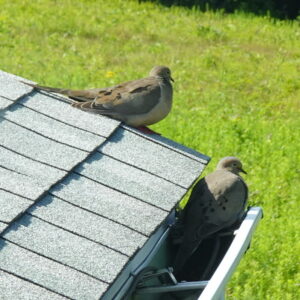 I watched with binoculars and my camera with a Zoom lens. As the babies grew, Papa strutted on the roof, and the feedings grew more frequent and vigorous. The parent’s devotion filled my heart with joy.
I watched with binoculars and my camera with a Zoom lens. As the babies grew, Papa strutted on the roof, and the feedings grew more frequent and vigorous. The parent’s devotion filled my heart with joy.
One evening, I heard their whistling flight and thought I saw three Mourning Doves flying. Looking down, I saw three lined up on the wooden railing below my bedroom window, two parents and a smaller nestling. Dinner was served on the railing and also in the rain gutter nest for the baby waiting there.
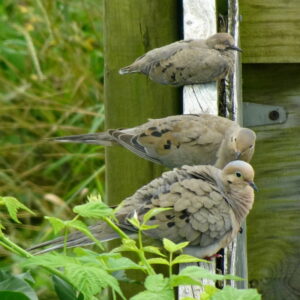 The next morning, three family members waited below. I felt the power of their patience to wait as long as it took for the last baby to leave the nest. In a few days, all four were on the railing and the nest was empty.
The next morning, three family members waited below. I felt the power of their patience to wait as long as it took for the last baby to leave the nest. In a few days, all four were on the railing and the nest was empty.
I grieved for the loss of my companions, but the family stayed around. Mama sat on my deck below the nest and hopped on a bowl filled with rocks, a few semi-precious stones, and rain water. She perched there for an hour reminding me why I love gentle Mourning Doves and their quiet meditative patience.
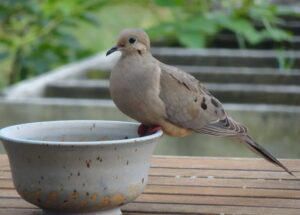 I learned dove babies can’t fly far for a few days and stay nearby, so maybe they spent the night in the spruce tree near the bird feeder. The next morning, Mama returned and settled in under the picnic table. She and her mate stayed close to the house and the fledglings all week.
I learned dove babies can’t fly far for a few days and stay nearby, so maybe they spent the night in the spruce tree near the bird feeder. The next morning, Mama returned and settled in under the picnic table. She and her mate stayed close to the house and the fledglings all week.
In a broken world, the Mourning Doves reassure me. They don’t read papers or follow the news. I hear their soothing Coo-coo-coo and the whistle of their wings and look outside to see them together pecking for seeds under the bird feeder or perched on the barn roof. The babies will stay with the parents to be fed until they can take care of themselves.
There are still Guardian Angels in this world.
***
Do you have birds or other wild animals that feel like family–at least temporarily? The Mourning Dove family is still here under the birdfeeder, on the porch, or on the barn roof. Do you share your life with birds, butterflies, lizards, or chipmunks? After diligent slow searching, I have 20 Monarch caterpillar babies. Monarch butterflies have been my guardians for years, and I’ll write more about that in my next blog. For my first post after the Mourning Doves arrived, see The Courtship of Aphrodite’s Doves. You might also enjoy Nature’s Lessons: Forgive, Protect, & Try Again.
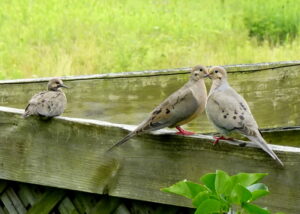
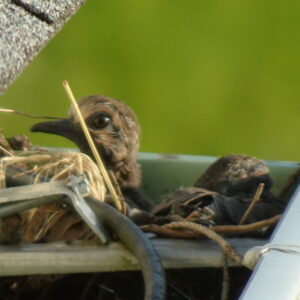
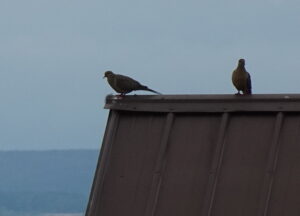
Dear Elaine,
Wow! What fantastic parents Mama and Papa Mourning Dove have been all summer! The part I love most in this wonderful post (apart from the fact that they chose to nest above your bedroom window in the first place and your wonderful photos that you’ve so generously shared!) is how all three birds patiently waited together for the fourth to gather the strength and courage to leave the safety of the family nest.
I love, love, love that Goddess Aphrodite sent Her beautiful beloved doves to keep you company this summer whilst the Monarchs seemed to lose their way for a while. However, their late arrival meant that space was available for others sentient beings to claim your heart and so your Nature Channel has grown in other directions. I imagine you’re keeping a close eye on those twenty caterpillars, Mama Monarch!
As we live on the very edge of ancient woodland we have many birds and wild animals in residence, yet none make my heart smile more than the sudden appearance of a red robin proudly displaying ‘love’s red breast’ and singing a sweet tune. Sending you much Lammas love and light across the oceans and oaks between us, Deborah.
They’re incredible parents and I don’t hear any complaints from them about cleaning up after the kids. The two parents and one fledgling waited at least two days for the last fledgling to fly while the parents continued feeding both of them. I was impressed, too, and love them more than ever. They’re still around every morning, probably because of the bird feeder. This is their territory.
I rarely see a Monarch butterfly–maybe two or three a week–but they’re out there because I find eggs. I look every morning through the milkweed patches which is where I find those few eggs. Last year was fast. This year is slow, but it’s lovely to walk through the fields in the morning and find a few tiny teardrop eggs and then wait to see which will hatch. I counted 25 caterpillars just now–from a few I can only see with a microscope to a chrysalis and a few large enough to make a chrysalis. The population should begin growing soon. I’m grateful I didn’t have to give up Monarchs entirely since they’re my occupational therapy and writing juice. I live next to a National Forest and there’s lots of wildlife here from deer to eagles and warblers to fox–and so much more. You know my favorite, but I’ll also have a favorite bird. I love the bluebirds, but they’re here a short time. The Doves stay all winter and in that way feel like true gardians. Love to you, Lin, and the robins, and enjoy your Lammas loaf. I don’t eat much bread, but today I bought a beautiful loaf made by an Old World Baker. Blessed Lammas.
I’m not a regular watcher of the PBS show “Nature,” but if I were, I’d petition the network to include your pieces in an ornithology broadcast with photos and narration. You are such a squinty-eyed observer and also invested emotionally in the birds’ wellbeing, be they mourning doves or another avian. Well done!
You ask, “Do you have birds or other wild animals that feel like family–at least temporarily?” My response, “Not really. But I do enjoy the promenade of neighbors leading their pets on morning and afternoon walks by my studio window. They are part of my community, that’s for sure.” Thank you for all this, especially the vivid detail, Elaine!
Marian, I wonder if your eyes make it hard to watch a screen for hours. I don’t watch “Nature” because of hearing. I can do it, but it’s a strain and there’s only so much energy in a day. I’m better off reading. Maybe for you, it’s listening. I’m so in love with the Mourning Doves. They’ve always been around, but never so close. I don’t know where they nested other years but hope they return to my rain gutter next year. My closest animal, of course, is Disco and before that Willow. I love watching all animals, wild and domestic. Thank you for your kind observant comments, Marian. They mean a lot to me. I hope FL weather is cooling. It’s been a strangely cool and wet summer here.
I don’t watch PBS Nature, I just know the program exists, and your post prompted me to think of it.
Another thing I thought of later: I’m so happy to read of monarch “babies.” I know you were longing to see them come back. 😀
I have about 20 small Monarch caterpillars (some can only be seen with a magnifying glass) and seven or eight larger ones via pure persistence in searches in the milkweed. I found two littles this morning–one egg and one just hatched caterpillar eating a leaf. I accept small numbers but wasn’t happy imagining a summer with no Monarchs at all.
I love how this family came to you and how you stayed with them! Beautiful piece.
Thank you, Harriet. I love them. They don’t look like Monarchs, but filled my longing for closeness with wild Nature in a similar way. There are a few more Monarchs now, but I don’t get to know them the way I got to know these Doves. The Mourning Doves are still around.
I love this piece Elaine. How wonderful to have these beautiful birds so close, to be able to see them nurture their young as they grow. I love how birds fledge in different ways, many sea birds take leaps of faith into the sea and those like your doves fly to nearby trees…apparently this is called ‘branching’…which makes sense! Having so much nature around you it must be so heartening to still be able to hear them ‘coooing’ as they gather in the trees…they certainly inspire you to write such interesting and sensitive nature notes.
For the past two years over the autumn, winter and into spring I had the same robin ‘helping’ me in the garden. Wherever I dug he would come along and root out the worms, in the end he would stand there waiting for me to dig and even came and stood on my shoe if I stopped a while. He felt like a wise soul and was such a joy to have working alongside me keeping that nature connection going!
Thank you, Lin. I have limited hearing with a cochlear implant in one ear and a hearing aid in the other, so I can hear birds and other nature sounds. (Zoom meetings and gatherings with many people talking at once are difficult and I often miss what’s being said.) Back to the Mourning Doves–they’re still around. They come to the feeder and peck around for seeds. They winter here, so may be taking charge of the territory. They’re lovely birds with their soft coos and their whistling wings in flight. The Bluebirds left for the season, but that means I see more Cardinals. Our robins which look nothing like your robins built nests in the magnolia tree–as usual. I love hearing about your Robin Friend. The Mourning Doves were in my garden this morning but I wouldn’t say they’ve adopted me. They like whatever they find in the garden, but don’t destroy plants. You have an incredible guardian figure and garden helper. It makes me happy to imagine this bird’s trust in you. I look out my office window at this moment and see a Mourning Dove by the feeder with a smaller dove which is likely the juvenile. I’m glad they’re here and hope they choose the same nesting spot next year. Have a lovely August break.
I relish your nature stories too, Elaine. I think you really are a nature mystic. And I’m thrilled to hear you have enough monarch babies in your nursery to satisfy your well-developed instinct for nurturance. Returning to Mother Nature after emerging from her so long ago is such a deeply satisfying way to spend my eldering years for me as well. I would love to end my cycle this time around with as much openness, wonder, and awe as I started with. Much love, Jeanie
Jeanie, each Monarch baby gets lavished with fresh milkweed and sweet talk. “On look at you, Little Sweetie. You ate all night and now I need to give you a fresh leaf or two. My pleasure.” At the moment, I’m admiring Monarchs rather than writing about much them. Maybe the writing part will reappear, but I like to watch them move, grow, and transform. They’re a living symbol for me. I hope to release eight healthy butterflies this week and there are many more in the queue. Hearing loss puts severe limits on my life and there’s no way around it, but the Monarchs don’t “hear” either. They pick up vibrations and movement and I can relate. Without collecting eggs in the milkweed patches and protecting them from spiders and other insects, I’m not sure there would be any survivors this year, but I’m glad to save 50 or more and hope to help delay extinction. It doesn’t look good for them in this climate change world and in their habitat in Mexico, but they’re still my summer love affair.
I have to baby doves that come back every morning and stay till it gets dark, not sure which of the parents it was, but one of them was killed not sure by what, all I found was feathers, but they had 2 babies and they haven’t left yet, they come back everyday
I read that one parent can tend the two chicks and it sounds like you experienced that kind of parenting devotion. I’m glad. I loved watching Mourning Doves up close which had never happened before.